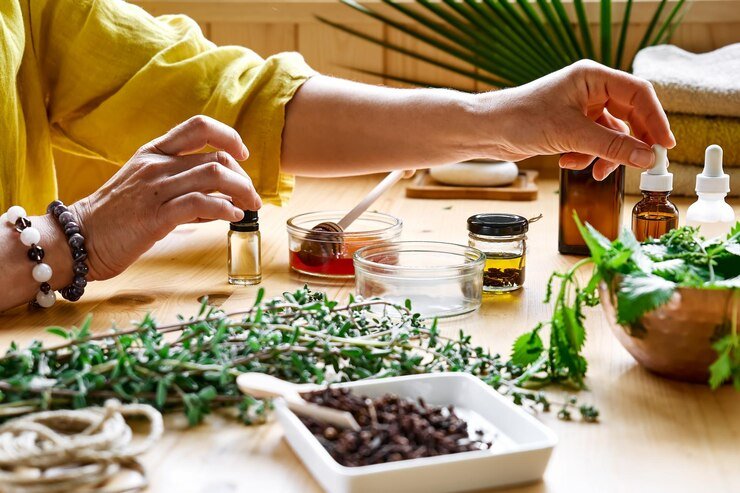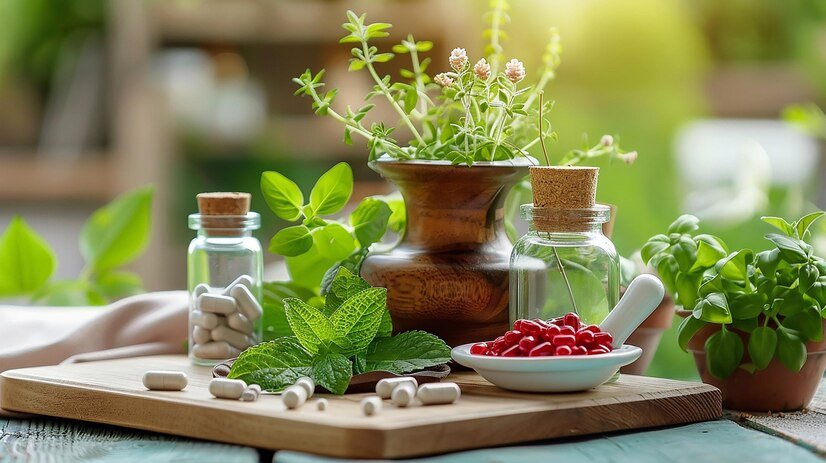
Homeopathy is a system of alternative medicine based on the principle of “like cures like,” which suggests that a substance causing symptoms in a healthy person can be used in small amounts to treat similar symptoms in a sick person. Developed over 200 years ago by Samuel Hahnemann, homeopathy uses highly diluted substances to stimulate the body's natural healing response.
Like Cures Like: Also called the Law of Similars, this principle posits that substances that cause symptoms in large doses can, in tiny amounts, treat similar symptoms. For instance, onion (which causes tearing and runny nose) is used in homeopathic remedies for colds with similar symptoms.
Dilution and Potentization: Homeopathic remedies are prepared through a process of serial dilution and shaking, or potentization, where substances are repeatedly diluted, often to the point where no molecules of the original substance remain. This dilution is believed to enhance the remedy’s therapeutic properties by transferring the "energetic imprint" of the original substance into the water or alcohol used in the remedy.
Individualized Treatment: Homeopathy considers a person's unique physical, mental, and emotional state when selecting remedies. Practitioners use a holistic approach, considering all aspects of the individual to tailor treatments specifically for them.
Homeopathy’s mechanism of action is not fully understood, and it has been a subject of debate. Some proponents believe that homeopathic remedies work by stimulating the body's self-healing mechanisms. According to this view, the dilution process imprints information from the original substance onto the solution, which then interacts with the body’s natural energy fields to encourage balance and healing.
Homeopathy is often perceived as slow-acting because it focuses on stimulating the body’s self-healing rather than providing immediate relief. However, the speed at which it works can vary:
Chronic Conditions: For long-term issues (like arthritis or allergies), homeopathic remedies typically work over an extended period. As they aim to address the root causes rather than suppress symptoms, treatment can take weeks to months for noticeable improvement.
Acute Conditions: For conditions like colds, fevers, or minor injuries, homeopathic remedies can work relatively quickly. In some cases, people report improvement within hours or days.
In summary, while homeopathy can be slower-acting compared to conventional medicine, especially for chronic issues, its approach encourages the body's natural healing over time.

Homeopathic remedies, based on the principle of "like cures like," are widely used for various health issues, ranging from minor ailments to chronic conditions. However, the effectiveness of homeopathic treatment greatly depends on following specific instructions when taking these remedies. Here are some important guidelines for patients to follow when using homeopathic medicine.
One of the fundamental principles of homeopathy is to avoid strong tastes and aromas close to the time of taking the remedy. Substances such as coffee, garlic, mint (especially in toothpaste), camphor, and strong perfumes can interfere with the action of the remedy. Ideally, avoid these substances for at least 30 minutes before and after taking the remedy to prevent them from affecting absorption or action.
Homeopathy often relies on precise dosages and timing. Remedies are usually taken in minimal doses, and overuse may hinder their effectiveness. Most practitioners recommend taking the remedy as prescribed, whether in pellet or liquid form. If the remedy is a pellet, it should be dissolved under the tongue for proper absorption. In general, homeopathic remedies are not taken daily but rather as a single dose or at specific intervals determined by the homeopath.
It is essential to avoid touching the remedy with bare hands, as direct contact can contaminate the pills or liquid. When handling the pellets, carefully pour the required dosage into the cap of the bottle and then directly transfer it into your mouth. For liquid remedies, use a dropper without letting it touch the lips or inside of the mouth.
Taking remedies on an empty stomach is commonly advised. Wait at least 30 minutes after eating or drinking before taking the remedy, and avoid consuming food or drink immediately afterward. Some beverages like coffee, alcohol, and highly acidic juices may reduce the effectiveness of the remedy and should generally be avoided during the course of homeopathic treatment.
Some substances are known to disrupt homeopathic treatments. Besides coffee, other substances like menthol, camphor-based products, and certain medications may interact negatively with the remedy. It is best to discuss with your homeopath which products or medications to avoid during treatment.
Homeopathic remedies are sensitive to light, moisture, and temperature, so they should be stored in a cool, dry place away from direct sunlight. Avoid keeping remedies in humid areas, such as bathrooms, and never refrigerate them unless specified by your homeopath.
Homeopathy emphasizes a holistic approach, meaning that patients should consider lifestyle adjustments to support the treatment. Avoiding stress, getting adequate rest, and maintaining a balanced diet can support the body’s natural healing process alongside the remedy’s effects. Informing the homeopath of any major lifestyle changes can also help in adjusting the remedy if needed.
Homeopathic remedies work on subtle levels, and patients may notice changes in both physical and emotional symptoms. It is essential to observe these changes and report them to your homeopath. This feedback helps in adjusting the remedy strength, dosage, or type, if necessary. Even if symptoms seem to worsen briefly, this could be part of the "homeopathic aggravation," a sign that the remedy is working, but it should be discussed with the practitioner to ensure proper guidance.
Combining homeopathic remedies with conventional medications requires caution. Although homeopathic remedies are generally safe, they may interact with other medicines. Before starting homeopathic treatment, consult your doctor and homeopath, especially if you are taking prescription medications. Your homeopath can guide you on how to manage both treatments without interference.
Homeopathic treatment is a gentle yet potent approach to healing that works best with mindful adherence to certain instructions. By avoiding strong tastes, handling remedies properly, observing food restrictions, and following your homeopath's guidance, you ensure that the remedy can work optimally. This practice encourages not only physical health but also mental and emotional well-being, aligning with the holistic philosophy at the heart of homeopathy.
Mr. Sandeep Kumar is a qualified homeopath registered with AROH (Australian Register of Homeopaths). Our website does not advise using any prevalent homeopathic medications through online homeopathic portals including S.K. Homeopathy without prescription or dispensing by a qualified practitioner. This website's content does not substitute for direct, personal, professional medical care and diagnosis.